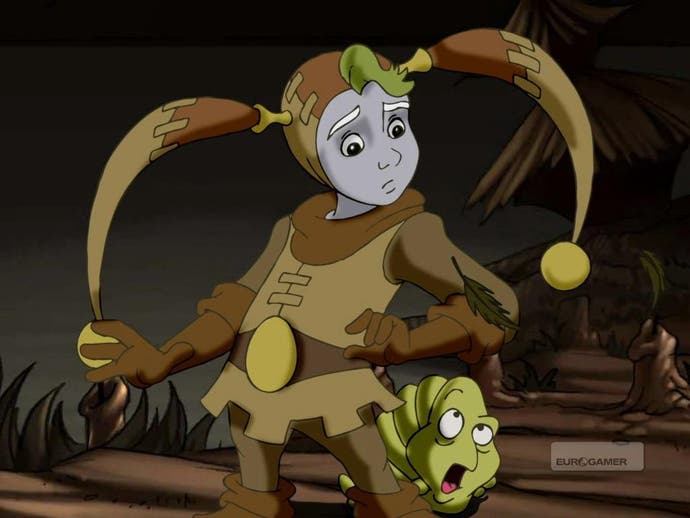The Whispered World
What?
The actor providing our hero's voice needs to have his vocal chords removed, sealed in a lead box and fired into space. You know that hateful baby voice Adam Sandler insists on doing in half his films? Times it by 20. It's excruciating to the point where I taught myself to speed-read just to skip his voice as quickly as possible. It's like having your favourite poem read out by Joe Pasquale.
There's another significant dialogue issue. There's no pause between multiple lines. If a character is saying a series of sentences, each clips the end of the last in a very distracting manner.
Sadwick finds himself on a quest to find the King, return the Whispered Stone, and prevent the end of the world he's prophesised to cause. Which, by the way, is a compelling reason to want to reach the end.
Accompanying Sadwick for most of the game is Spot, the strange green grub. He's capable, the game introduces to us without any explanation at all, of eventually shape-shifting into five different shapes.
You begin with his regular chompy self, and a heavier, rounder ball-shaped version. Later comes a fire-breathing form, and two more that shall remain surprises. Shape-shifting forms the basis for some of the puzzles, either changing Spot to fit a task or sometimes changing from one form to another in a particular circumstance.
Bizarrely though, these abilities are rarely used, especially in the first three of four chapters. Rather than thinking of inventive ways to apply this novel inclusion, most of the time you're performing standard inventory puzzles that range from ordinary to abysmal. Chalk and water - that makes white paint right? Wrong. And how else would you recover clothing out of your reach than by dangling a mouse over it?

Perhaps more demoralising are the absolute hoariest of adventuring stalwarts appearing without a glimmer of irony. So yes, there is a sliding tile puzzle. And yes, slap your forehead, there's a locked-door-with-a-key-on-the-other-side puzzle. But rather than just letting you poke it out onto the tray that fits under the door, you have to attach a needle to a wooden spoon (making a "spoodle", which forgives some of the crime) to be able to reach. How thick is this door exactly?
Most annoying are the impossibly random moments. You need to catch a fly from a kitchen. You have a wooden board covered in sticky rotting food. Surely? But no - that has nothing to do with it. Of course you're meant to catch the fly by using the chopsticks you have in your inventory. What? And it's not a punchline to a Karate Kid setup - it's completely out of the blue. It's daft.
When you finally discover the solution to a bad puzzle (perhaps by translating a German walkthrough) you can see how the designers had got there in reverse. Working backward the logic they were seeing becomes apparent. The problem here is a lack of perspective for the player approaching it forward.

